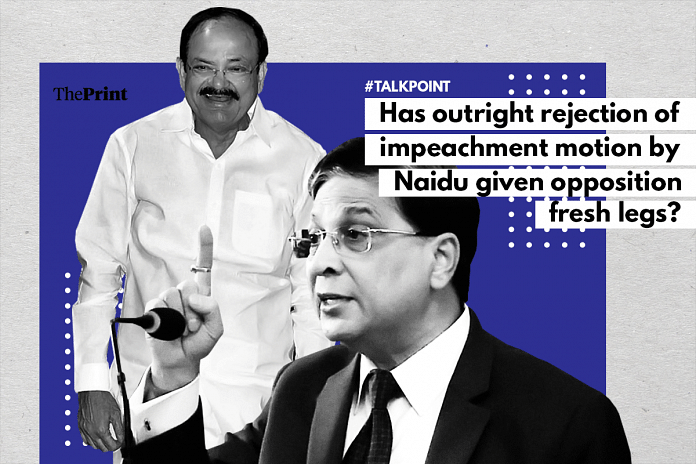Vice-President Venkaiah Naidu has rejected the impeachment motion against the Chief Justice of India signed by 64 MPs of seven parties led by the Congress. Naidu said the MPs were unsure of their own case, and this will undermine and erode the respect for the judiciary.
Congress in a press conference stated that it will be petitioning the Supreme Court to challenge Naidu’s decision.
ThePrint asks: Has outright rejection of impeachment motion by Naidu given opposition fresh legs?
Congress party is politicising the judiciary and making a frontal assault on its independence
 Nalin Kohli
Nalin Kohli
Spokesperson, BJP
Article 124 is absolutely clear. It is either on incapacity or proven misconduct that such a motion can be entertained. It can’t be on the basis of conjecture; there must be reasonable ground. The Vice-President has to pursue it from the position of the correct constitutional provisions.
The Congress’ motion is driven by political reasons and not any moral or constitutional argument. The party is guilty of politicising the institution and making a frontal assault on the independence of the judiciary. This is what they did in 1975 as well because they wanted pliant judges.
Rahul Gandhi speaks of saving the Constitution. The only assault on the Constitution happened in 1975, never before and never after that. Narendra Modi has said it on record that we will always function only according to the Constitution.
Will a group of lawyers or political parties decide what cases a court will hear? Will they decide when judges will hear a case, or whether a case deserves to be heard?
The Supreme Court is an institution of eminence, and every judge is an eminent institution by himself or herself. They have enough knowledge and wisdom to take decisions in the interest of the institution. Whatever changes take place, if any, will either be done by the judiciary or according to the mechanisms provided by the Constitution.
They can’t be decided on the basis of the agenda or allegations of a political party.
Judiciary has become the latest tool in Congress’ already depleted arsenal to somehow achieve political relevance given their falling electoral success.
Rather than acting as the chairman of the Rajya Sabha, Naidu is acting as a ‘party’s’ vice-president
 Madhu Goud Yaskhi
Madhu Goud Yaskhi
National spokesperson, Congress
The issue has obviously escalated because the decision that has been taken is against parliamentary traditions, customs and rules. The basic requirement, of a certain number of MPs signing an impeachment petition, was met. In such a case, the Chairman has to accept it. That is what the rules dictate.
The Vice-President is acting against the rules and against the Constitution. This rejection is discriminatory. Rather than acting as the Chairman of the Rajya Sabha, he is acting as a ‘party’s’ vice-president.
The decision is unfair and biased. The Constitution of India is supreme. Be it the Rajya Sabha, the Lok Sabha, or the Supreme Court, all institutions have to function in congruence with the Constitution. A person holding a constitutional position, whether it is the President, Vice-President, governor, election commissioner etc, must work according to constitutional principles and not party affiliations.
The petition was drafted as per the law. The least we expected was that the vice-president would follow the law and the constitution.
The BJP is making false accusations against the opposition and wants to suppress dissent. A healthy democracy requires a strong opposition. However, Narendra Modi doesn’t believe in democratic principles.
Deliberations on how to proceed further are already underway. Leaders are coming together and deciding the next course of action. At the press conference today, the Congress has already stated that we will be moving to court.
We have to question whether Venkaiah Naidu has taken a prima facie view of the matter
 PDT Achary
PDT Achary
Former secretary general, Lok Sabha
Venkaiah Naidu is the Chairman of the Rajya Sabha and it is, thus, completely within his discretionary powers to allow or disallow such a motion on the floor of the house. However, before taking this decision, he has to examine all the material evidence available to him and consult legal experts. These are requirements under the law.
Then, he has to take a prima facie decision on whether a case can be made out on the basis of the allegations of “misbehaviour”. The onus to prove this misbehaviour will then fall on a committee, which will be constituted for this very reason.
It is presumed that Naidu has applied his mind and exercised the discretionary powers he has under the law. However, we have to question whether he has taken a prima facie view of the matter.
The preliminary decision has been taken by an authority designated under the law, that is, the chairman of the Rajya Sabha. The aggrieved party may have a right to challenge it.
If it is sent to the Supreme Court, then the issues of who will rule on the judgment will, of course, resurface. The Chief Justice cannot possibly rule on a case he is accused of.
The speed with which the impeachment move was rejected has made it highly suspect
 Abishek Jebaraj
Abishek Jebaraj
Advocate and Managing Partner, Isaac and Jacob
The outright rejection of their impeachment motion today has given the opposition fresh legs on the controversial issue because the speed at which it was passed, and its interpretation of constitutional provisions, has made it highly suspect.
The order of rejection is unconstitutional on the face of it because it erroneously holds even the admission of the motion to a standard of “proved misbehaviour” by citing Article 124(4) of the Constitution. However, the words “proved misbehaviour” used in Article 124(4) are only in reference to the final order of impeachment passed by the President of India after the motion has been finally voted on in Parliament.
If the interpretation given by the Vice-President stands, it will negate the need for the Judges Inquiry Act, 1968, which calls for an inquiry committee to probe misconduct after the motion is admitted. In essence, the rejection order will make it near impossible to remove any judge for judicial misconduct. That is because it may be impossible to prove misbehaviour before an inquiry committee is even constituted.
Even if one steers clear of the merits of the present controversy, it’s hard to see how the Vice-President could equate himself with the President under Article 124(4) of the Constitution.
The opposition will now need to convince people that it wasn’t targeting the CJI over the Ram Janmabhoomi matter
 Maneesh Chhibber
Maneesh Chhibber
Editor (Investigations & Special Projects), ThePrint
The swift decision by Vice-President M. Venkaiah Naidu to reject the impeachment motion signed by 71 MPs (seven completed their term before the motion was presented to the VP) is only going to give credence to the charge that the government is trying to save the Chief Justice of India.
It will certainly give much-needed oxygen to the opposition, which has, so far, been unable to get its act together against the Narendra Modi government. Naidu’s super-quick action will also bolster the opposition charge that the Modi government is trying to control and, thus, erode several institutions.
Naidu’s 10-page order leaves a lot to be desired.
But will the opposition be able to convince the public that it had no mala fide intention in moving the impeachment motion? To achieve that goal, it may have to aggressively question Naidu’s motives in rejecting the motion. If it manages to do that, the opposition will consolidate the perception that the government saved the CJI because it plans to ‘use’ him.
The opposition will have to battle another narrative that the BJP is building: That the real reason behind the impeachment move is the Congress’ bid to get rid of the CJI because it doesn’t want him to decide the Ram Janmabhoomi matter.
If this narrative gains ground, the only victor, by a huge margin, will be the BJP.
Compiled by Deeksha Bhardwaj, journalist at ThePrint.




Venkaiah naidu was,is and will be the stooge of Modiji and his brain has very little capacity to independently weigh the rules and regulations.
This is nothing but setting up a very bad precedent. Since the opposition members of the parliament fail to fight the govt in power within the precincts of the parliament as is apparently evidenced by frequent disruptions they are causing so far, they seem to have started attacking all the institutions under the guise of protecting democracy. They are not perhaps able to have many things going their way including in courts due to their political intent behind their moves and apparently they have created flimsy grounds to create a constitutional crisis now. The UPA Govt was aware of the land purchase by CJI when they nominated him to supreme curt and why question the present Govt for its folly. The Parliament members cannot decide how supreme court should function on administrative issues and by alleging that cases are given to other judges to influence a judgement in casting aspersions on those judges which itself is a contempt of the court. If there is any doubt over medical admission case, they can approach the court with a review petition. I feel the Vice president has rightly dismissed the motion that looks to be politically motivated.
In the Lok Sabha, the no confidence motions ought to have been taken up for discussion. The numbers were in place, so no harm could have been done. There would have been powerful speeches from both sides, an airing of issues that are already in the public domain. 2. Similarly, the impeachment motion ought to have been processed further. If the charges are so devoid of merit that the Vice President could dismiss them at the threshold, a duly appointed Committee would have exonerated the honorable CJI, erasing the shadow that will now linger. There would also obviously have been no vote in Parliament. 3. When the order of rejection is challenged in the apex court, all eyes will be on the composition of the Bench that will hear the case. If the four seniormost judges are excluded, in a matter of extraordinary importance for the institution, that will add to disquiet. 4. For the CJI personally, the complete politicisation of this matter will hurt. In the few months that remain, he might wish to avoid dealing with matters of political import, where a favourable verdict may be misunderstood. To maintain the aura of the apex court, he may also be pleased to ensure that the well laid out succession plan is scrupulously adhered to.